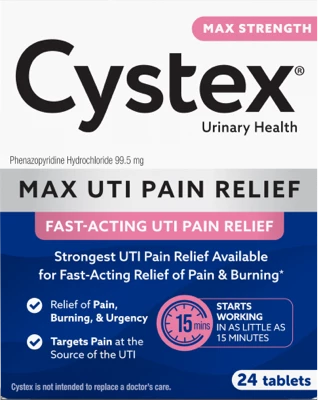UTI
Myth vs Fact
Find out how much you really know about UTIs.
A UTI is preventable.
Unfortunately, a UTI is not 100% preventable. However, there are steps you can take to reduce your chance of getting a UTI, such as urinating before and after sex, drinking plenty of water, wiping from front to back and taking Cystex Urinary Health Maintenance every day as a preventative measure.* Learn more about preventing UTIs.
Source: http://www.mayoclinic.org/diseases-conditions/urinary-tract-infection/basics/prevention/con-20037892
Having sex can result in a UTI.
Sex is a common cause of UTIs in women because sexual intercourse can introduce bacteria into a woman’s urinary tract. During sex, the urethra comes into contact with the bacteria from the genital area and anus, allowing them to enter the urethra, the bladder, and possibly eventually the kidneys, and result in an infection. In fact, almost 80 percent of premenopausal women with a UTI have had sex within the previous 24 hours. To help prevent this, you should always urinate before and after having sex.
Source: http://www.everydayhealth.com/urinary-tract-infections/the-link-between-utis-and-sex.aspx
Pregnant women are more likely to get a UTI.
UTIs are more common in pregnant women because hormones can cause changes in the urinary tract, which predispose women to infections. In addition, a growing uterus presses on the bladder, preventing the complete emptying of urine. This stagnant urine is a likely source of infection.
Source: http://www.webmd.com/women/guide/pregnancy-urinary-tract-infection
Birth control can cause a UTI.
Use of certain types of barrier contraception can also increase the risk of a UTI. Women who frequently develop urinary tract infections (UTIs) after sexual intercourse reported using condoms, diaphragms or spermicides while engaging in sexual activity. A common belief amongst the urological community is that these barrier contraceptive methods irritate the sensitive tissue in the vaginal and genital areas in women who may be allergic. This irritated tissue then helps create an environment where bacteria can thrive.
Cranberries can cure UTIs.
Cranberries cannot treat or cure UTIs. Only an antibiotic will cure an established UTI. However, there are steps you can take to prevent future UTIs from developing.
Source: http://health.clevelandclinic.org/2015/10/can-cranberry-juice-stop-uti
Only women can get a UTI.
Men, women, children, babies…no one is immune to UTIs, however, women are more likely to get them.
Source: https://www.niddk.nih.gov/health-information/urologic-diseases/bladder-infection-uti-in-adults
A burning sensation when urinating is the only UTI symptom.
While burning sensations during urination is the most common UTI symptom, there are plenty of other symptoms including a frequent or intense urge to urinate, even though little comes out when you do; pain or pressure in your back or lower abdomen; urine that appears cloudy, dark, or bloody; strong-smelling urine; feeling tired or shaky; fever or chills. Learn more about the color of your urine.
Source: http://www.mayoclinic.org/diseases-conditions/urinary-tract-infection/basics/causes/con-20037892
Untreated UTIs will eventually go away.
Untreated UTIs lead the bacteria to spread from the bladder to the kidneys, eventually causing kidney infections. Kidney infections are more serious and require antibiotics, and oftentimes, hospitalization. In some rare circumstances, untreated UTIs can spread beyond the kidneys to the blood stream. It’s important to call your doctor as soon as you think you have a UTI.
Recurring UTIs always mean something is wrong.
UTIs are so common that there is no need to be concerned if you experience a handful of simple (uncomplicated) infections over a lifetime that are properly treated by your doctor. However, getting three or more UTIs within one year, or two or more within six months, meets the definition of recurrent UTI. You and your doctor should work together to investigate what’s causing your UTIs. Your doctor may want to do some tests to make sure there isn’t another medical condition or situation contributing to your increased UTI risk. Other next steps may include discussing options including a long-term antibiotic prescription, intravaginal (not oral) estrogen, self-care (including increasing fluid intake and other daily life tips), and – potentially – supplementation with specific probiotics, vitamins, and/or enough of the compounds found in cranberry called proanthocyanidins or PACs. Whichever route you and your healthcare team decide, know that you are not alone; recurrent UTIs affect more than 30% of women and often there is no clear-cut reason why.
Source:
http://www.everydayhealth.com/sexual-health/urinary-tract-infections-keep-coming-back.aspx,
https://www.aafp.org/afp/2016/0401/p560.html,
https://www.auanet.org/meetings-and-education/for-medical-students/medical-students-curriculum/adult-uti
Urinary Tract Infections (UTIs) are contagious.
UTIs are not contagious and cannot be passed onto a partner during intimacy.
Source: http://www.medicinenet.com/is_a_urinary_tract_infection_uti_contagious/article.htm
A urinary tract infection is a sexually transmitted disease.
While some sexually transmitted diseases, such as trichomoniasis and chlamydia, can cause irritation to the urethra, a urinary tract infection (UTI) is not transmitted from one partner to another.
Source: http://www.memd.me/conditions/urinary-tract-infections/
Urinating after sex can prevent UTIs.
This is only true if the bladder is full enough to produce a powerful stream. Squeezing a few drops of urine out after sex will not move any bacteria out of the bladder. Drink adequate amounts of water before sex, or wait until you really have to go. Proper urination after sex is the key. Learn more about UTIs and sex.
Source: http://www.everydayhealth.com/urinary-tract-infections/the-link-between-utis-and-sex.aspx
Frequent UTIs are a hygiene or “dirty” problem.
Recurrent UTIs are relatively common, impacting 30% of women. While there are certainly self-care and hygiene tips that can be helpful in maintaining good urinary health, harsh or extreme “cleanliness” can actually make UTI infections more likely, not less. Appropriate hygiene for your most sensitive parts focuses on being gentle. Beyond hygiene, you and your doctor should work together to investigate what’s potentially causing your UTIs. There are options available that may help manage recurrent UTIs including longer or as-needed doses of antibiotics, topical hormonal options, and consideration of specific supplements.
Source:
http://womenshealth.gov/publications/our-publications/fact-sheet/douching.html,
https://www.womenshealth.gov/a-z-topics/urinary-tract-infections,
http://womenshealth.gov/publications/our-publications/fact-sheet/vaginal-yeast-infections.html,
http://emedicine.medscape.com/article/1958794-overview,
https://medlineplus.gov/ency/patientinstructions/000391.htm,
https://www.aafp.org/afp/2016/0401/p560.html,
https://www.auanet.org/meetings-and-education/for-medical-students/medical-students-curriculum/adult-uti










